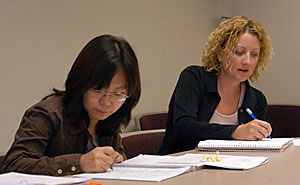 |
|
MATTHEW ROBLES / Arizona Daily Wildcat
|
Public health graduate students Wen Zhang and Kristina Luther take notes during class Friday at the Arizona Health Sciences Center. The College of Public Health ranks among the top 10 in the nation for minority enrollment.
|
|
|
By Georgeanne Barrett
Arizona Daily Wildcat
Monday, September 13, 2004
Print this
Health college at top in American Indian student enrollment in U.S.
The UA's College of Public Health is ranked first nationally in American Indian student enrollment and sixth in Hispanic student enrollment.
Recent data from the national Association of Schools of Public Health states that among 33 accredited schools of public health, the Mel and Enid Zuckerman Arizona College of Public Health ranks in the top 10 in total minority enrollment in accredited schools of public health.
"The data reflects our commitment and mission to eliminate health disparities in the Southwest," said G. Marie Swanson, dean of the Zuckerman College of Public Health, in a press release. "The College not only reaches out to minority populations to recruit faculty, staff and students, but also focuses its community service and research in these populations."
Programs within the Zuckerman College of Public Health concentrate on the reduction of health disparities, the maintenance of healthy communities and the promotion of healthy lifestyles.
According to the ASPH's annual data report, 35 percent of students enrolled in the college in fall 2003 were from minority populations. Of that 35 percent, 13 percent identified themselves as Hispanic, and 9.1 percent identified themselves as American Indian/Alaskan Native.
Chris Tisch, assistant dean at the Zuckerman College of Public Health, said the college is proud of its ranking among minority students enrolled, because this is their first accredited year since the college started in January 2000.
"This is the first year we have been looked at," Tisch said. "I think it clearly speaks to the populations we live among."
Tisch said students in the program, especially American Indian students, have been the best source of recruiting new students to the college.
Tisch also said since much of the work the college does is related to health disparities in the diverse populations of the Southwest, having a high percentage of minority students is not a surprise.
"The goal is that we will have students who have developed research skills, who will go on to use these skills in their careers," Tisch said.
Tisch said the Zuckerman College of Public Health hopes students of all ethnic groups who are involved in the program, will be able to go on in their careers and apply the knowledge of health disparities they have received from the college.
The Zuckerman College of Public Health is the only public health college in the eight-state western mountain region, and they are committed to promoting the health of individuals and communities with an emphasis on the diverse populations of the Southwest, Tisch said.
Chaz Lacy-Martinez, a graduate student in the college who was recruited two years ago, said the college is very diverse and provides many research opportunities in diverse communities.
"There are a lot of health disparities with different ethnic groups in the country" Lacy-Martinez said. "We need to address these issues so we can go into communities with a better understanding on how to help them."
Lacy-Martinez said the Zuckerman College of Public Health has helped him further his ambitions to help people from all ethnic groups.
He said one of the college's major goals is to reflect the populations of the Southwest and the health disparities that those communities face.
"The program has really given me the opportunity to help in my endeavors and reach my goals," Lacy-Martinez said.
Lacy-Martinez is also involved in Project EXPORT, a fellowship the college provides to 20 students per year who focus on Hispanic or American Indian health.
Project EXPORT is a five-year program, funded by the National Institutes of Health, that focuses on diabetes and substance abuse prevention.
The fellowship offers students $8,000 per year for research in one of those areas.
